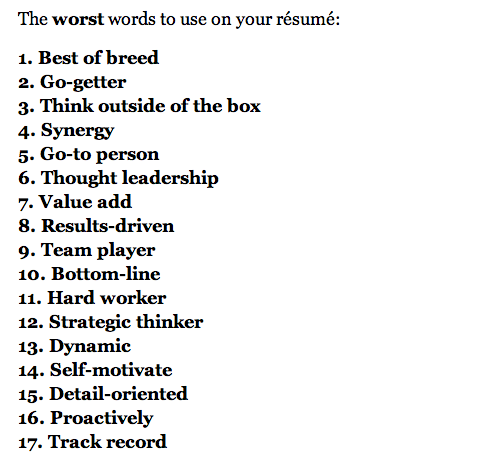Don't Use These 17 Words In Your Resumé
The words you choose to use in that little paper called your resumé can make or break your career.
6.25 seconds, that is the amount of time an employer spends looking at your resumé before deciding whether or not they like you.
6.25 seconds, that is the amount of time an employer spends looking at your résumé before deciding whether or not to contact you.
Image via dice.comOne recent study showed that recruiters spend all of 6.25 seconds looking at a candidate’s résumé before deciding whether he or she is fit for a job. While some 17% of hiring managers said they spend 30 seconds or less, 68% said they scan a résumé for as long as two minutes before putting it aside. Still, that’s hardly any time to impress someone who could determine your employment future.
forbes.comThe national survey by CareerBuilder was conducted online by Harris Poll on behalf of CareerBuilder from November 6 to December 2, 2013, and included a representative sample of 2,201 hiring managers and human resource professionals across industries and company sizes.
careerbuilder.comHow to impress an employer in 6.25 seconds? The words you choose to use in your resumé can pique the employer's curiosity to read more.
“Hiring managers prefer strong action words that define specific experience, skills and accomplishments,” said Rosemary Haefner, vice president of human resources at CareerBuilder.
careerbuilder.comHowever, the wrong selection of terms can also be a turn off and make the employer hit the 'delete' button
“Subjective terms and clichés are seen as negative because they don’t convey real information. For instance, don’t say you are ‘results-driven’; show the employer your actual results.”
careerbuilder.comInstead, employers would like to see strong verbs like these 15 words:
Active words which demonstrate results are looked upon favourably by hiring managers.
Image via news.com.auAccording to job search site The Ladder, employers spend time scanning through resumés looking for keywords that matched the open position
TheLadders used eye-tracking software to study the behavior of 30 recruiters over a 10-week period, to see how they read résumés.
The study subjects spent the remaining 20% of their résumé-scanning time looking for keywords that matched the open position. But while they read keywords, according to the study, recruiters based their decisions on those six pieces of data.
forbes.comThe study also shows that recruiters spend 80% of that six seconds looking at just six things:
Name
Current title/company
Previous title/company
Previous position, start and end dates
Current position, start and end dates
Education
forbes.comRemember, self-praise is no praise. Always describe the results you've achieved to show your accomplishments.
The message: Don’t include sweeping terms of self-praise, like “team player,” “go-getter” and “self-motivated.” Rather describe your accomplishments specifically with words like “improved,” “created” and “increased” and a specific explanation of exactly what you did, including numbers whenever possible.
forbes.comFor instance, instead of saying you added value to your sales team by your dynamic, results-driven efforts to proactively boost sales, say you improved every monthly sales target in the last six months by 40%. In other words, instead of saying you are results-driven, show the results you’ve achieved.
forbes.com





